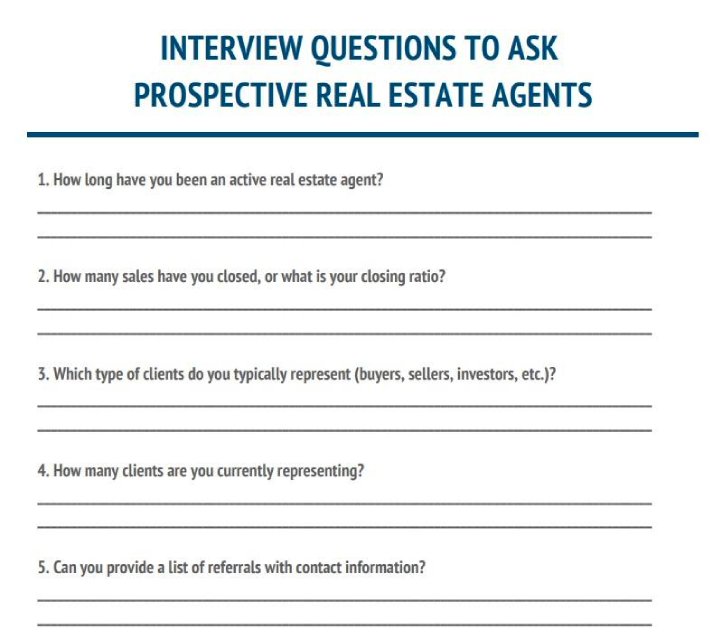Finding a great real estate agent can be challenging if you don’t know what to look for. To find a great real estate agent, you must know what you want in terms of their personality, business acumen and skills, and your goals for buying or selling property. A great real estate agent has knowledge of the local market, is involved in their community, and has a strong online presence. We provide 11 actionable tips to find, evaluate, and interview real estate agents so you can find a rock-star realtor to accomplish your buying or selling goals.
If you’re a real estate agent, use this article to sharpen your skills and provide the highest-quality service for your clients. Measure your performance against our tips to see where you can grow and improve.
1. Know What You Want in an Agent
The first step in learning how to find a realtor is to get clear on your needs and know what you want. Experience is crucial, but their personality, goals, and values must align with yours. It’s important to know what you want so that when you research and interview agents, you know what to look for in a realtor and which questions to ask.
To determine what to look for in a real estate agent, think about the following items:
- Credentials and community involvement
- Personality
- Communication skills
- Expertise and knowledge in particular markets and areas
- Marketing and advertising skills (both on and offline)
Based on these items, decide what you want your agent to be like—personality and expertise-wise. You also might prefer someone outspoken and driven or reserved and thoughtful. Are they someone who people are drawn to? These things matter because you’ll be communicating with them frequently. If you’re in a real estate niche or seeking a specific property type, such as commercial real estate, you’ll want to work with someone who is familiar with that specialty.
2. Prepare Interview Questions & Interview Real Estate Agents
To gauge which agent is best suited for you, you need to know which questions to ask in an interview to end up with the right agent. We’ve prepared this free download with some basic questions to cover and a few questions with a fill-in-the-blank so that you can customize them to your circumstances.
As part of your interview process, request references from former or current clients and other agents. Additionally, you’ll want to assess their knowledge of the market where you want to buy or sell and ensure they have closed similar sales that match your goals, so you’re not training someone on your time.

Interviewing agents is essential to finding an excellent agent.
Interview at least three agents to find the right fit. During your interview, assess their personality type and how they communicate regarding your style so you can ensure you don’t clash. Of course, you want someone who is honest and has high integrity.
Pro tip: Take the interview process seriously. Most people don’t take the time to interview real estate agents. They hire someone they know or the first listing agent who enters the door. However, as a real estate investor, you’re operating a small business, so you’re hiring a real estate agent to work for you. Follow the adage, “Slow to hire, quick to fire.” They are not employees, but they are pivotal in your real estate investing success.
3. Choose the Right Type of Realtor
Not all real estate agents are created equal, so it’s essential to know how to find a great real estate agent who matches your situation when choosing a realtor. For one, there are differences between a real estate agent vs broker vs realtor. Still, some agents specialize in a niche, provide various services, hold role-specific certifications, or exclusively represent buyers or sellers.
As you’re learning how to choose a realtor, note that most, if not all, are required to hold an active, valid real estate license. While we’ve provided examples in the table below, note that great real estate agents are required to have specific credentials other than a real estate license. However, they should have skills that relate to the services you’re looking for.
Type of Agent | Who They’re Best For | Skills |
|---|---|---|
Certified Relocation Professional (CRP) | Investors who want to buy out-of-state properties and buyers who are relocating. |
|
Seller's Agent or Listing Agent | Property owners who want to sell their properties. A seller’s agent can also help with picking a realtor for buyers. |
|
Buyer’s Agent | Buyers who want top-shelf personal service and representation. Investors who want help finding investment properties for sale. |
|
Commercial Real Estate Agent | Investors buying or selling commercial and multi-family commercial real estate. |
|
Leasing Agent | Landlords and investors who want someone to market and fill vacancies. |
|
Certified Residential Specialist (CRS) | Investors, homeowners, and buyers who own or want to purchase a single-family, duplex, triplex, or fourplex. |
|
Investors who want to work with one agent for buying, managing, and selling properties. |
| |
Real Estate Teams | Excellent choice for investors who are building a real estate portfolio. |
|
General contractors and developers who want an agent to sell their new construction. |
|
Real Estate Agents for Special Situations
You want an agent who matches your needs, so you may need one who has expertise in special situations, such as dividing assets in a divorce, estate sales, or working with veterans. Or, you might want to provide low-income housing or invest in preforeclosures, auctions, short sales, and foreclosed properties. These special situations are nuanced, so when interviewing agents, ask about their experience relative to your circumstances.
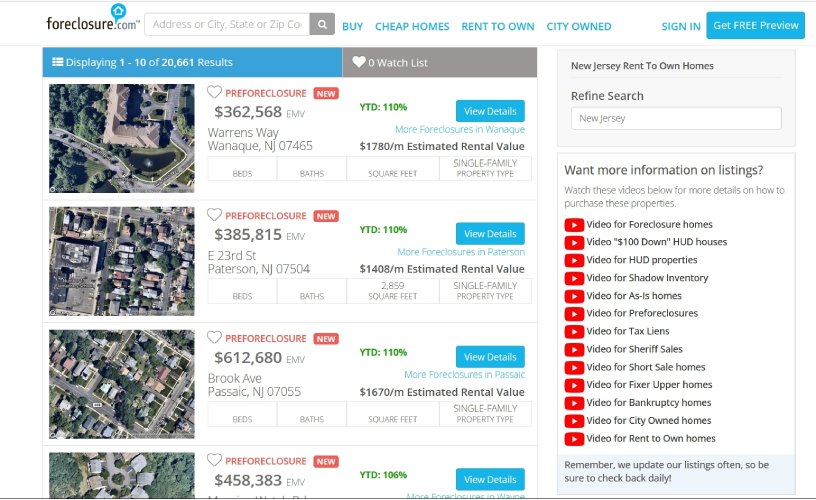
Directory of preforeclosures in New Jersey (Source: Foreclosure.com)
If you’re in the market for preforeclosures, foreclosures, and distressed properties, check out Foreclosure.com. Type in your location, and it searches thousands of databases for bank-owned, preforeclosures, foreclosures, and government-owned properties, where you can save up to 75% at closing.
4. Decide if You Want to Work With a New or Experienced Agent
New real estate agents often get a bad rap, and the general advice is to find a top producer with a lot of experience. However, don’t be quick to dismiss an agent because they’re new. You may miss out on someone who will work much harder for you than an experienced agent who already has a lot on their plate.
If the agent is new, ask them if they have any related experience and where they attained it. They could be a landlord or previously worked for a property management or title company, or have other similar experiences. They may be so hungry and driven to succeed that they’ll go far beyond the extra mile. Everyone has to start somewhere.

Don’t rush to dismiss an agent because they’re new.
You are taking a bit of a risk on someone green, so if you find a new agent who you think will be a great fit, ask them to provide a clause in your contract that you can cancel if you’re unhappy with their services. First, try to work it out, but if you can’t, you don’t want to be tied to a long-term contract with someone who is not the right fit.
Working with an experienced agent provides some reassurance that they know how to find the property type you’re buying or have experience listing and marketing properties for sale. They also may have an expanded network of people interested in your property. Working with an experienced professional can save you time since there is no learning curve, which can also save you money.
Consider the pros and cons of working with a full-time vs part-time real estate agent. Simply because someone is full-time doesn’t mean they’re more available than someone part time. A highly organized part-time agent with fewer clients can sometimes be the better choice than someone full-time but disorganized with too many clients. Flesh out their project and time management skills in your agent interview.
5. Ask for Word-of-Mouth Referrals
Start by asking other investors and real estate professionals, such as lenders, home inspectors, title examiners, and real estate attorneys, if they can recommend a great agent. If you have a real estate agent who helped you purchase your home but is not qualified to work with investors, you can also ask them who they recommend. To find the right fit, get at least three recommendations.

Getting a recommendation is the best way to find a great real estate agent.
You can also ask friends and family, but start with your business contacts if those closest to you aren’t knowledgeable about investing in real estate. They may have an excellent agent who helped them buy their home but lacks the experience to meet your needs.
Pro tip: Don’t feel obligated to hire a friend or family member who is a realtor. You certainly can hire them if they’re the right fit, but you’re under no obligation to hire someone simply because you have a connection.
6. Attend Open Houses & Schedule Showings
Attending open houses allows you to see the realtor in action and initiate conversation. You can observe how they interact with others and show the property. You can also see what kinds of materials about the home they bring to the open house, such as listing sheets, real estate brochures, and disclosures. Getting this firsthand knowledge of how they operate shows you how they will manage the sale of your property and aid in deciding if they’re right for you.

Open houses are a great way to observe an agent’s skills.
Your observations will give insight into the agent’s professionalism and how enthusiastic they are about their client’s property. In addition to attending open houses, schedule a few showings with different agents to see how they present properties. Suppose you’re an investor who is looking for commercial properties. In that case, scheduling a showing will provide the opportunity to tour buildings and assess an agent’s knowledge and skills.
7. Check Out For Sale Signs
Drive around and call agents’ phone numbers from real estate for sale signs so you can locate agents who work in your area, and schedule a property tour or interview to get to know them better. However, one of the best ways to use signs is to see how prevalent the agent is around town. If you see their signs everywhere, it’s an indication that they are active and experienced in working with sellers. You will still need more information, like how many of their listings sell and their closing ratio and time frame, so ask about these things in your interview.

Custom real estate sign (Source: Vistaprint)
Many agents purchase for sale signs from VistaPrint. You can browse its designs to see if you like any and recommend them to your agent. You can also use them to create for rent signs to place on your property and advertise vacancies if you don’t yet have a real estate agent to work with.
Visit VistaPrint
Use Promo Code: FSB25 for 10% off $75, 15% off $100, 20% off $175, and 25% off $300+
8. Evaluate Online Profiles
As part of your research to find a great real estate agent, look at their online presence. Check out their website, social media pages, and profiles, and look for their profiles on sites like Zillow and Realtor.com. At a minimum, their website should show their current listings and past sales and how to contact them. They may have social links so you can navigate to their pages and profiles, which should have recent activity, no more than two weeks old.
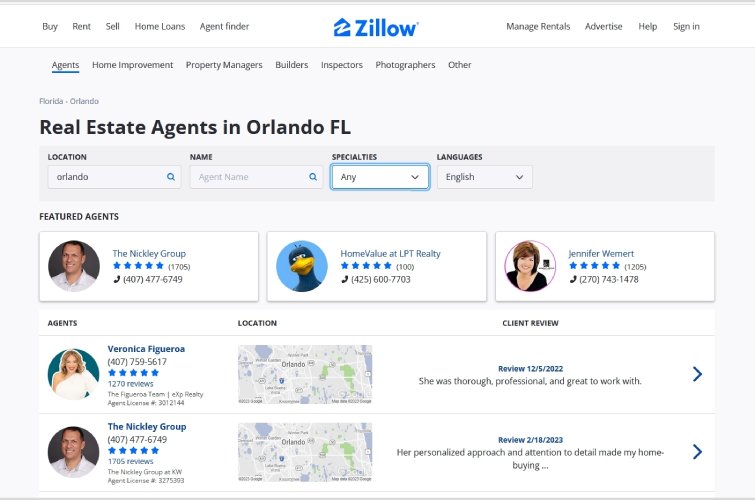
Search for agents with Zillow’s Agent Finder. (Source: Zillow)
9. Assess Their Community Involvement
Successful agents are active in their communities. They take on civic responsibilities like volunteering, hosting and participating in events, and joining local community groups. They value showing gratitude, giving back to their community, and its positive impact on their business.
This also benefits you as a buyer or seller since they’re so well-connected. Before properties hit the market, they often talk to others who want to buy or sell or know of a great investment opportunity. It also shows their character—that they’re not all about making money, even though their involvement may also enhance their business.
10. Check Their Real Estate License Status & Potential Violations
Ensure the agents you’re looking into have valid and active real estate licenses in the states where you want to buy or sell. You can check their license status online by visiting your state’s real estate licensing board and using their online license lookup tool. Type their name in the box and hit search, and their license number, status, and brokerage information should appear.
Checking violations and disciplinary actions varies by state. Some states provide that information on the license lookup page, while others may be on an affiliated government website. Sometimes, the information may not be available online but requires a call to the local licensing division.
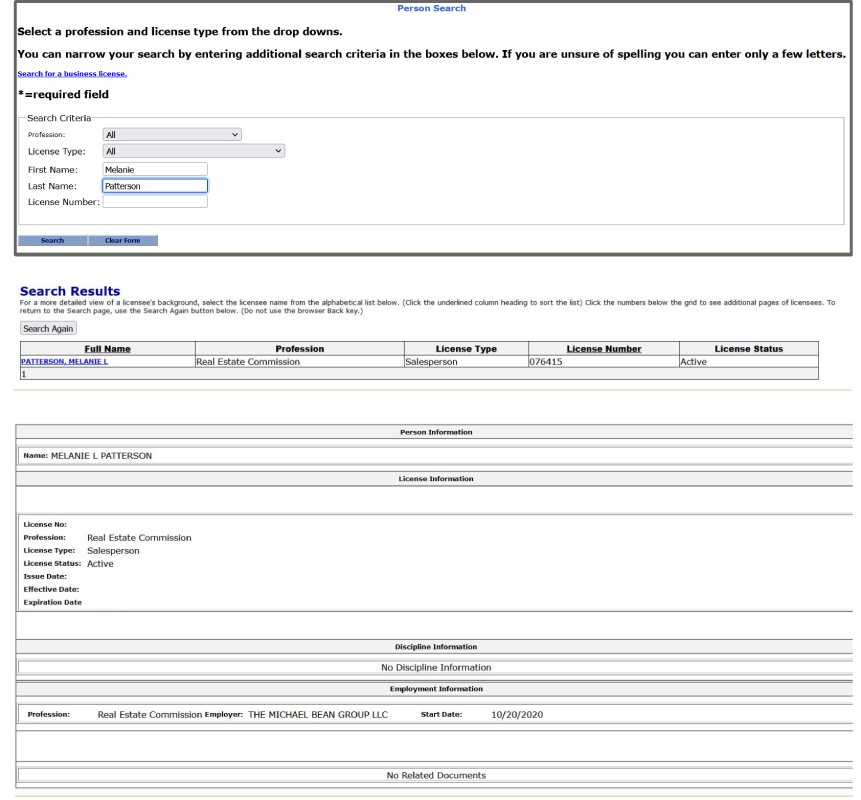
License lookup varies by state. (Source: NH Office of Professional Licensure & Certification)
Remember, it doesn’t always mean it’s valid if someone files a complaint. Also, not all complaints provide details or outcomes if the complaint was resolved privately. Ideally, you want an agent with no complaints or violations, but if you find a great agent and notice complaints older than five years, don’t write them off quickly. Evaluate what the complaint was about to see if it’s a deal-breaker, and assess how many complaints have been filed.
11. Red Flags When Selecting a Realtor
Unfortunately, we don’t know what we don’t know. Sometimes you can make mistakes in choosing a realtor you think is right for you, but red flags pop up. We’ve covered a few red flags already, like numerous complaints filed, agents who are disorganized and too busy, and agents who claim to do it all. Here are more red flags where you must proceed with caution:
Your real estate agent must always be professional. Sometimes badmouthing other agents is deliberate to win your business, and sometimes it happens inadvertently. For example, a client had a bad experience with another agent and vented to their new realtor. The new realtor implies passively or directly that it often happens with that agent.
They may not even say anything at all, and instead, they roll their eyes or nod in agreement, indicating that the other agent is not good. If you encounter this behavior, think twice about hiring them. Their thoughts and opinions about other agents are irrelevant to helping you achieve your goal. A professional response would be, “I’m sorry you had that experience,” or “Sometimes agents and clients aren’t a great fit for each other,” and the conversation should move on.
Federal fair housing laws, and sometimes additional state-level laws, protect the rights of certain groups based on religion, race, sexual orientation and gender identity, age, national origin, color, familial status, and hidden or visible disabilities. Agents cannot discriminate, refuse to show properties or rental units, or steer someone in a protected class toward or away from specific neighborhoods or properties.
Most agents know this, but sometimes their unconscious bias could surface with off-handed comments such as, “I don’t think you want someone like that living in your apartment,” or “I wouldn’t buy in that neighborhood if I were you.” Asking someone where they’re from could also be considered discriminatory. If the agent expresses their opinion or makes any type of reference about a protected class, steer clear of them. First, you don’t want to discriminate, but you also don’t want to be part of a potential lawsuit if someone thought you were involved.
Sometimes, seemingly innocent and helpful remarks violate client confidentiality. Sadly, this happens more than you’d expect. The seller’s agent shows buyers the property and says, “He’s eager to sell. Between you and me, I know he’d take less.” Or, in reverse, the buyer’s agent tells the listing agent, “This is their offer, but they can afford a lot more than this.”
An agent who does this is not working in their client’s best interest. The person they’re sharing this information with might appreciate receiving the intel, but if an agent does, they’re breaching their contract with you. If their client has permitted them to provide this information to the other party, that’s not a violation, but proceed with caution because it’s rare a client who would want their agent to share something like this.
One of the biggest complaints sellers have about real estate agents is that they never hear from their agents again after the seller lists. The agent lists the home, puts up a sign, uploads it to the Multiple Listing Service (MLS), and expects it to sell itself. You can avoid this by asking the agent about their marketing strategy for your property and telling them how often you want updates.
When learning how to find the best agent to sell your home, you’ll interview a few by inviting them to look at the property and present their services to you. If they come unprepared without a listing presentation, it’s a red flag. You can see this in the agent who doesn’t take the lead. You want a leader in your corner and someone who is polished and prepared.
A great real estate agent should come with a listing presentation that answers most of your questions, such as how they will market your property, information about them and their brokerage, their fees, and offer advice on how to prepare your home. They provide a comparative market analysis (CMA) of your property’s current fair market value so you can price it competitively while getting the highest and best offer. If the agent shows up and waits for you to take the lead, choose someone else.
Agents are legally required to disclose any known material defects of a property. A prudent agent wouldn’t take a listing from a seller who asks them not to disclose property defects. If the agent says, “We can throw a rug over that big stain on the wood floor. It will be our little secret,” this could land you, the property owner, in a lawsuit.
The agent may put a cover over something to help the property show better in photos and in person, but they must uncover it during the showing and tell the prospective buyers about it if they know it’s there. The size of a material defect doesn’t matter. However, agents are not inspectors or contractors, so if they or the seller are unaware, they shouldn’t give their opinion or advice. The appropriate response is to advise a buyer to hire a home inspector or suggest that the seller repair and maintain the property.
As a property owner or buyer, it’s critical to know your state’s laws on property disclosures. You also need to know the rules on federal laws, like lead paint disclosure requirements. Some states require sellers to fill out a property disclosure form listing defects and the age of the roof, electrical, and heating systems, while others only require verbal disclosure. Be sure to ask your agent about property disclosures.
As you’re learning how to choose a realtor, resist the temptation to hire the agent who outprices other agents on your property’s value just because they say they can get you more. Real estate agents must always back up their price quotes with market data. Some agents list properties at any price the seller wants just to obtain listings.
When evaluating how to pick a realtor when selling your house, note that it’s a red flag because it wastes your time. Overpriced listings actually tend to sell for much less, sit on the market, and can become stigmatized because prospective buyers question why it isn’t selling. So, whatever price an agent tells you your property is worth, make sure they back it up with hard data.
An agent can represent both a buyer and a seller in a transaction provided it is disclosed, and all parties agree in writing. Dual agency is illegal in some states, so ask your agent how it works in your state. This becomes a red flag when the agent is in a contract with a seller and tells buyers they will represent them or act as if they are, without their client’s consent or to their knowledge.
The penalties for not disclosing or getting an agreement on dual agency are severe. An agent can lose their license, the transaction can be reversed, and the agent can be sued. Sometimes an agent unintentionally acts as a dual agent when they assist the other party, such as helping a buyer negotiate financing.
If the agent is in a contract with either the buyer or seller and offers to represent you in that transaction, ask how they handle dual agency. In some states, dual agency agreements are written in the contract; an agent should review this with you.
Real estate agents’ commissions and fees must be transparent to their clients and disclosed as part of your buyer’s or seller’s agreement. However, they don’t have to share their commission rate with other agents. Agents typically charge around 6% of the home’s selling price. Real estate agents also disclose how much of their commission will go to another agent who sells their listing. This is included in the property data sheet, recorded in the multiple listing service (MLS), and on public listing sites.
Agents cannot add fees after their costs are disclosed. For example, an agent can’t suddenly increase their fee for extra work or purchase services like home staging and later ask for the money to be repaid at closing. An agent can encourage a homeowner to and even recommend one or pay for part of the service themselves.
Unless a seller waives the agent’s obligation, realtors are responsible for presenting all offers on a property to the seller until it closes, even if the property is under contract. Typically, when a house is under an agreement, the listing agent will share this information with the buyer or their agent, and the offer is rescinded.
This scenario is not necessarily a violation. It is generally understood that the buyer and seller will not break the accepted agreement unless the deal falls through and the property becomes available, so prospective buyers pull their offer and look for other properties. However, the agent still needs to tell the seller about all offers unless the seller waives this obligation in writing.
A big red flag is an agent advising on things outside their role and expertise. While realtors receive some education and training in real estate finance and laws, they are not attorneys or financial advisers and should not provide advice.
They can refer you to a lawyer or accountant and help you use formulas like a cap rate and gross rent multiplier (GRM) to determine an investment property’s value and profit potential. Still, they shouldn’t advise you on investment property taxes or business finances.
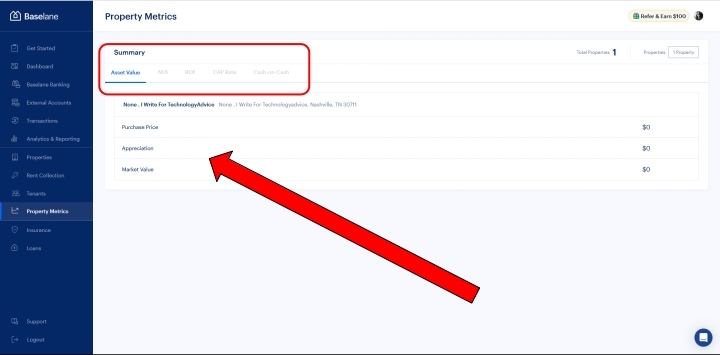
Property metrics from the Baselane dashboard. (Source: Baselane)
If you’re looking for top-of-the-line financial and analytics tools and banking software, check out Baselane. It provides a bank account balance snapshot with credits, debits, and total balance over a monthly period. It also provides property metrics, including purchase price data, appreciation, and market value. Plus, upcoming features will include net operating income (NOI), return on equity (ROE), cap rate, and cash-on-cash return.
Bottom Line
Now that you know how to find a great real estate agent, you can begin your search and set up interviews. Use our interview questions as a guide and fill in the blanks with additional information and situation-specific questions. Check their online profiles, assess their community involvement, and use our red flags to avoid hiring the wrong agent.
